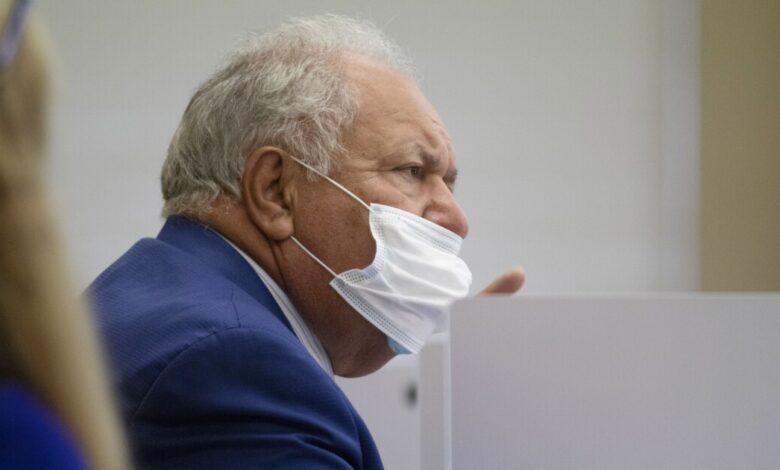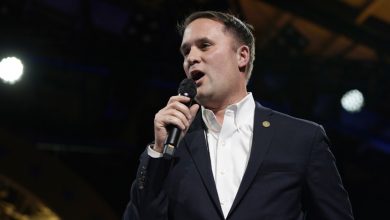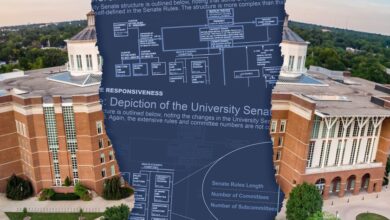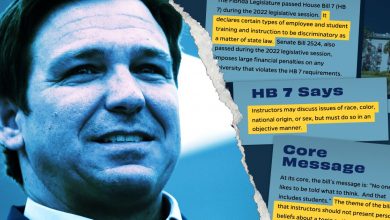Florida’s Flagship Is Beset With Controversy. Its Board Says Everything Is Fine.

In a fiery response to criticism that the University of Florida improperly barred professors from testifying against the state in a voting-rights case, the chairman of the university’s Board of Trustees on Friday denied having had any influence on the decision and stated unequivocally that Florida’s Republican governor had played “absolutely zero” role in the matter.
The university came under fire in late October after The New York Times first reported that administrators, applying the university’s conflict-of-interest policy, had blocked professors from serving as expert witnesses in litigation against the state. Doing so, professors were told, would be “adverse to UF’s interests.” The case raised immediate concerns over academic freedom, and within days the university reversed its decision and said the professors were free to testify.
Reading from a lengthy prepared statement, Morteza (Mori) Hosseini, the board’s chairman, pushed back on Friday against what he described as a false narrative that Ron DeSantis, the state’s governor, had sought to block the professors from testifying. Hosseini, whom DeSantis appointed to the board, added that he and his board colleagues had not acted on the governor’s behalf in the case.
“While the media has suggested the governor has played some role through this relationship with me in UF’s decision on outside activities and conflict of interest, let’s be clear: That is a hundred percent false,” Hosseini said. “Neither I nor any other member of this board, the governor nor any legislator, had any influence on specific decisions on outside activities and conflict of interest. Period. The first I learned about these decisions was when I read the story in the paper.”
In response to criticism, W. Kent Fuchs, the president, established a task force to review its conflict-of-interest policy. Fuchs accepted the group’s recommendations that the university operate with the “strong presumption” that it will approve requests from faculty and staff members to testify as private citizens in litigation that involves the State of Florida, “regardless of the viewpoint” of the testimony. Under the recommendations, denials can only be made with “clear and convincing evidence” of a particular harm that the testimony could bring to the university.
In his defense of the board, Hosseini said that the trustees had no interest in squelching free speech. Changes in recent years to the university’s conflict-of-interest policy, he said, were instead precipitated by concern that some professors were profiting from outside work on university time, Hosseini said.
“As UF was learning about these faculty members who were moonlighting across the world and not disclosing their outside activities to UF, and sometimes not in their classrooms or their labs for many months out of the year,” he said, “we realized we needed to make improvements to the outside-activities approval processes and the monitoring of their commitments.”
Hosseini went on to blast faculty members who, in response to the controversy, have called on donors to withhold money from the university.
“I am also personally very disappointed in local faculty-union leadership who are actively encouraging donors to stop contributing to the university,” he said, “and who are actively encouraging university presidents and provosts around the country to downgrade their reputation assessment of the University of Florida in ranking surveys. All of that damages their fellow faculty members and students we serve.”
In his comments, which were praised thereafter by his fellow board members, Hosseini did little to engage with some of the central critiques that have arisen in the wake of revelations about the university having blocked professorial testimony — essentially casting the debate as a news-media creation. Faculty critics have argued that the potential for offending the state’s reigning political authorities ought not to have been considered a legitimate conflict of interest, and that the university’s administration is overly deferential to the perceived desires of conservative politicians in the state.
The case has put the University of Florida, which has seen its national reputation and rankings rise in recent years, at the center of prickly debate over the state of academic freedom in a polarized political environment. The university’s regional accrediting agency and a congressional subcommittee have said they will investigate the matter. Six professors have joined a lawsuit against the university. The plaintiffs include Sharon Austin, Michael McDonald, and Daniel Smith, the three professors who were initially barred from testifying; along with Jeffrey Goldhagen, a pediatrics professor, and the law professors Kenneth Nunn and Teresa Reid.
The debate over expert testimony is among several recent controversies at the University of Florida that have raised concerns about political interference. Fuchs drew criticism, for example, for not not mandating this semester that students and employees wear masks indoors to prevent the spread of Covid-19 — something Fuchs said state rules forbade him to do. (None of the university’s trustees or Fuchs wore masks at the meeting on Friday.)
This week, the faculty union filed a grievance stating that professors had been told they should hold off on creating a doctoral concentration titled “Critical Study of Race, Ethnicity, and Culture in Education” because it could invite a backlash from lawmakers opposed to the teaching of critical race theory.
In a brief interview with The Chronicle after the meeting, Hosseini reiterated that there had been “absolutely zero” political interference in this case. When asked if he thought there was any merit to the concern that university administrators were overly deferential to political actors in the state, Hosseini said, “I don’t think so, but at the end of the day, the legislature, the taxpayers of Florida, the people that are funding us, we have to look at what the needs of our students are. We can’t just in the abstract make decisions. You have to take everything into consideration.”
At several points during Friday’s meeting, Florida’s trustees sounded surprised or disappointed that faculty members, who have been awarded pay raises and seen benefits increase — expansions in “Baby Gator” day care were mentioned several times — were feeding into a political controversy that they saw as without merit.
“These things,” Hosseini said of faculty benefits, “were all made possible through the support of our state leaders.”
Hosseini’s fellow board members echoed his sentiments, praised his leadership profusely, and spoke about trying to correct what they saw as an inaccurate public narrative that has in recent months engulfed the university.
“I’m wondering if we should in a more visible way clear up the facts demonstrating our commitment to academic freedom,” said Rahul Patel, a trustee, “and reiterating that nobody on this board has in any way influenced any specific decisions around academic freedom, as has been reported in the media — and perhaps otherwise acknowledging that, with the exception of a few vocal-minority faculty, we are in sync 100 percent with our faculty.” After the trustees concluded their remarks, the chairman asked Fuchs if he had anything to say about the controversy. He declined to say anything, and a university spokesman told The Chronicle that the president would not speak to a reporter after the meeting.
Thomas G. Kuntz, the board’s vice chairman, told The Chronicle that none of the recent controversy had raised concern for him about academic freedom. “I don’t think anybody was suggesting anybody’s freedom of speech be stifled — in fact, to the contrary,” he said.
Nor did Kuntz feel any political pressure about the professors testifying in the voting-rights case, he added.
“I haven’t had a conversation about this with a single politician anywhere,” he said. “I learned about it from my sister.”
Emma Pettit contributed reporting from Washington, D.C.
Source link






